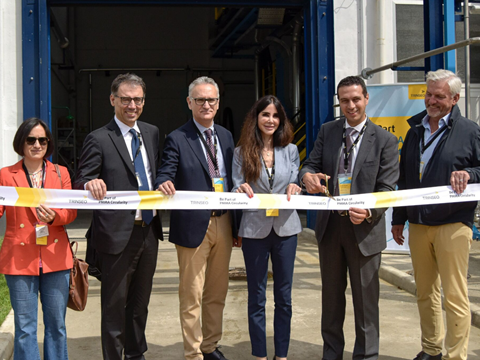
Trinseo has announced the opening of its polymethyl methacrylate (PMMA) depolymerization facility in Rho, Italy, on June 25, hoping to advance a circular infrastructure for acrylic solutions.
Depolymerization is a chemical recycling process that returns acrylic solutions to the constituent monomer, methyl methacrylate (MMA). The company states that, complementary to other recycling technologies, depolymerization helps close the loop for acrylic recycling, and it is said to have several advantages over traditional processes.
Trinseo says that, by utilizing this technology, acrylic solutions can be recycled - including PMMA sheets, which previously could not be mechanically recycled. It adds that returning the material to its monomer form allows additives and contaminants to be removed from pre- and post-consumer acrylic products, enabling more PMMA to be recycled.
Apparently, Trinseo’s depolymerization technology uses findings from the MMAtwo Consortium, a collaborative initiative funded by the European Union’s Horizon 2020 research and innovation programme. It is set to develop a new value chain for pre- and post-consumer PMMA, and establish a versatile recycling process for converting this waste into high-quality regenerated monomer with carbon footprint reduction versus virgin MMA.
The recycled MMA (rMMA) generated by Trinseo’s depolymerization facility is utilized in the company’s ALTUGLAS and PLEXIGLAS R-Life product portfolios. Through this new facility, Trinseo can reportedly produce rMMA that is comparable to virgin raw materials. Trinseo states this can be used in high-demand applications, such as vehicle taillights or caravan windows that require high optical quality.
Earlier this year, Trinseo introduced its new flame-retardant resins, manufactured without the use of per-and polyfluoroalkyl substances (PFAS) or halogenated additives. The products were set to be launched on the Asia-Pacific market initially, suitable for applications such as IT equipment, electronic and electrical products, battery chargers, and voltage stabilizers.
In similar news, GR3N has announced the opening and launch of an industrial demonstration plant for its microwave-assisted depolymerization (MADE) technology in the hopes of becoming the ‘world’s leading supplier’ of PET and polyester rebuilt from recycled monomers. Through this process, GR3N expects to close the loop on PET and derive food-grade polymers from a range of end-of-life plastic.
If you liked this story, you might also enjoy:
How are the top brands progressing on packaging sustainability?
The ultimate guide to global plastic sustainability regulation















No comments yet